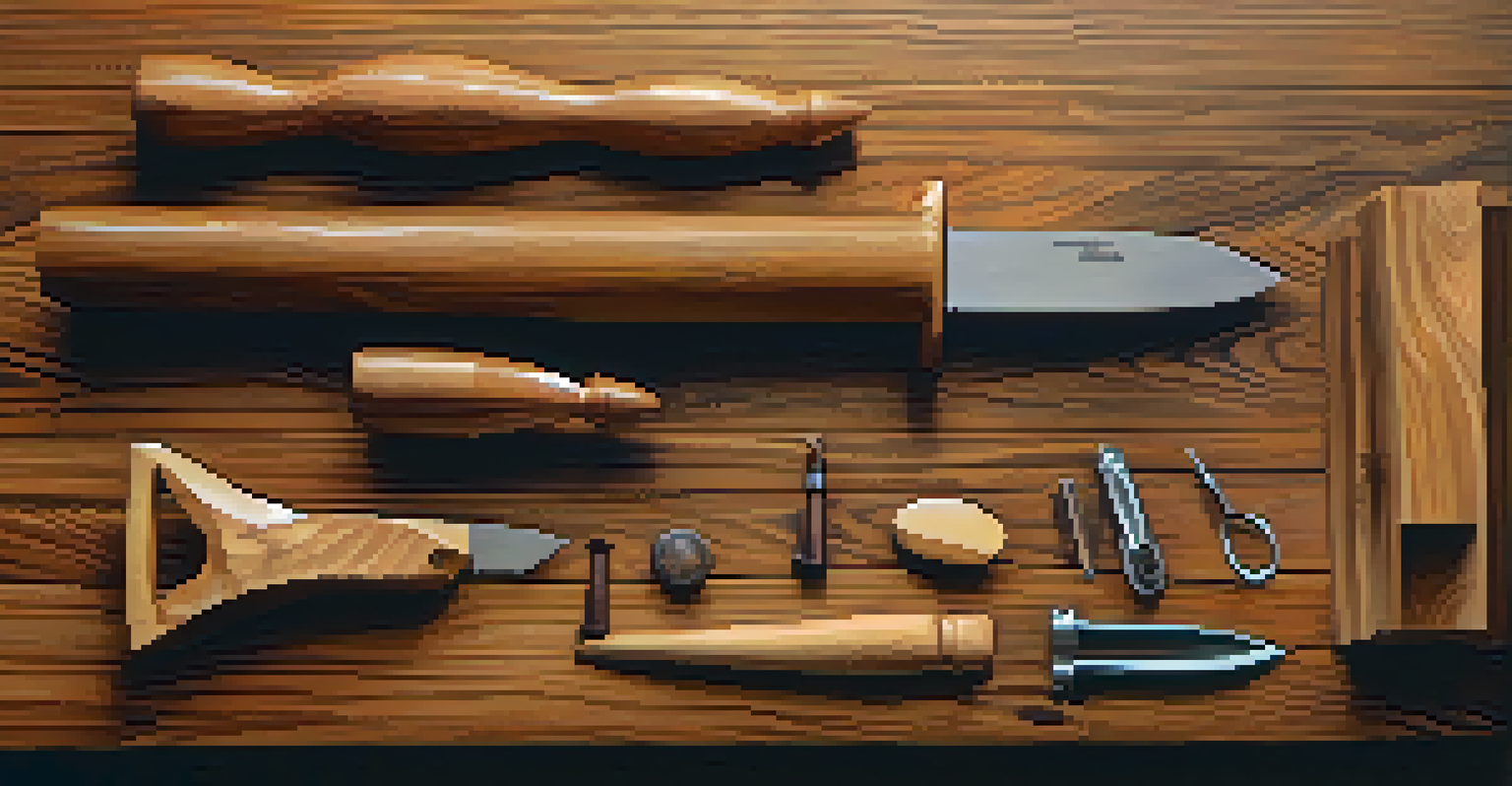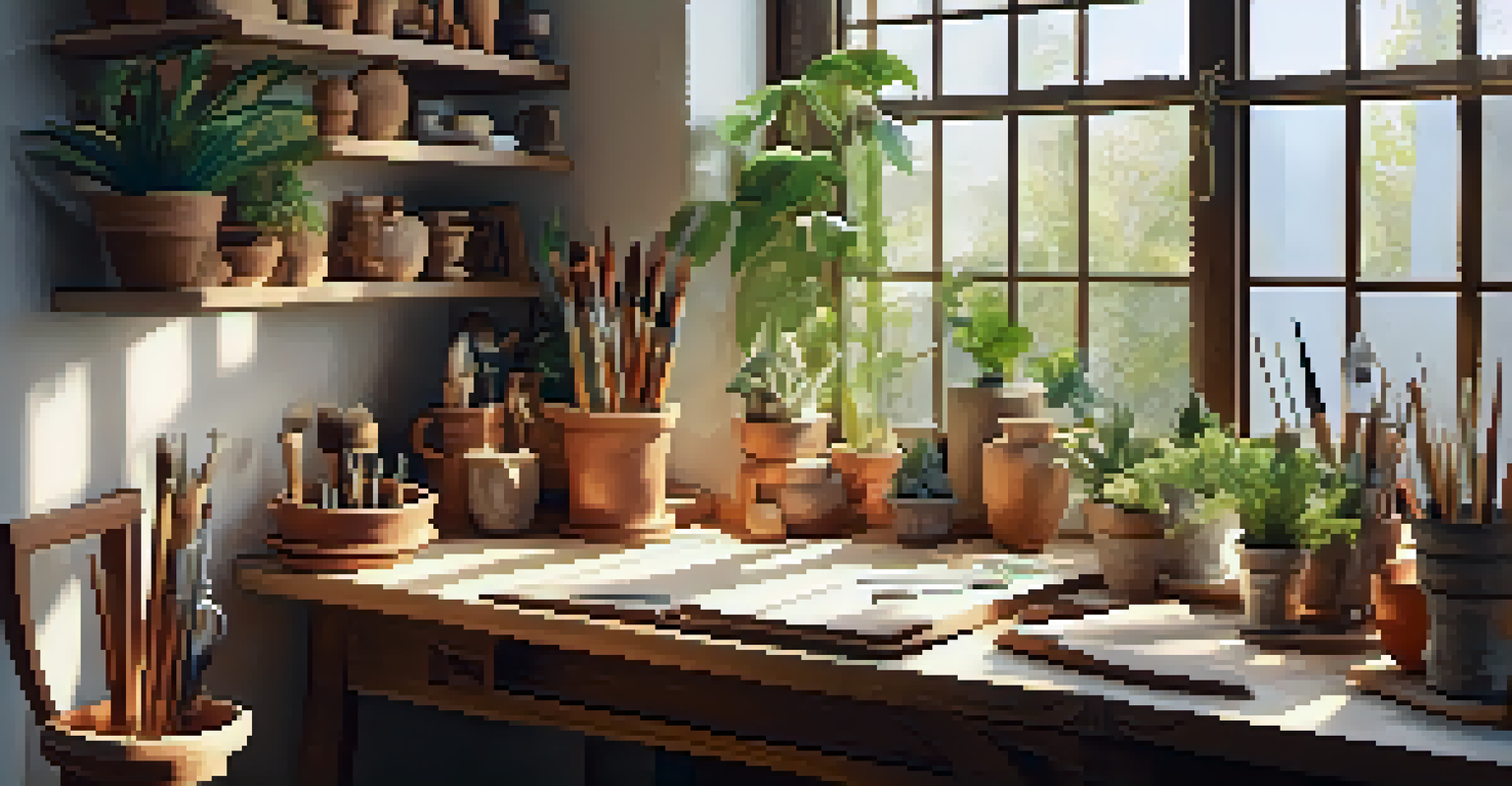Engaging with Nature: Carving Wood for Mental Clarity

The Therapeutic Benefits of Nature Connection
Spending time in nature can be incredibly rejuvenating. Studies show that interacting with natural environments can reduce stress and anxiety. For many, engaging with nature is not just a pastime but a pathway to mental clarity.
In every walk with nature one receives far more than he seeks.
When you immerse yourself in nature, the sights, sounds, and smells can help ground you. This sensory experience can provide a much-needed break from the hustle and bustle of daily life. Imagine the soothing sound of leaves rustling in the wind or the vibrant colors of a sunset; these moments can be truly restorative.
Wood carving, in particular, allows you to harness this connection to nature. As you carve, you not only work with a natural medium but also become part of the environment surrounding you. This engagement can lead to a deeper appreciation for the world around us.
Understanding the Art of Wood Carving
Wood carving is an ancient craft that transforms raw wood into beautiful art. This practice requires patience, skill, and a keen eye for detail, making it a great way to focus your mind. The process can range from simple shapes to intricate designs, allowing for personal expression.

As you carve, you enter a state of flow, where time seems to stand still. This meditative aspect can help clear your mind of clutter, promoting mental clarity. The rhythmic motion of carving can also be soothing, much like a form of active meditation.
Nature Reduces Stress and Anxiety
Engaging with nature can significantly lower stress levels and promote mental clarity.
Moreover, the tactile nature of wood adds to the experience. The feel of the grain beneath your tools, the scent of freshly carved wood, and the sight of your creation coming to life all engage your senses, enhancing your connection to the craft and nature.
Finding the Right Tools for Carving
Choosing the right tools is essential for a fulfilling wood carving experience. There are various types of chisels, knives, and gouges specifically designed for different techniques and styles. Investing in quality tools not only makes the process smoother but also encourages you to engage more deeply with your craft.
The creation of a thousand forests is in one acorn.
For beginners, a simple starter set with a few basic tools can be sufficient. As you grow more comfortable, you might explore specialty tools tailored to your projects. Just like any artist, your tools become an extension of your creativity, allowing you to express your unique vision.
Additionally, ensuring your tools are well-maintained can enhance your carving experience. Sharp tools make for cleaner cuts and reduce frustration, allowing you to focus on the joy of carving rather than battling with dull blades.
Creating a Dedicated Carving Space
Having a dedicated space for carving can significantly enhance your experience. It doesn’t need to be large; a small corner of your home or workshop can suffice. The key is to create an environment where you can be comfortable and free from distractions.
Consider adding natural elements to your space, like plants or wooden surfaces, to enhance your connection with nature. Good lighting is also crucial, as it allows you to see your work clearly, reducing eye strain and improving focus.
Wood Carving Enhances Mindfulness
The practice of wood carving encourages mindfulness, helping you stay present and focused.
This dedicated space becomes your sanctuary, a place where you can retreat to carve and unwind. Over time, this consistency can foster a deeper relationship with your craft and the natural world.
Embracing the Learning Curve
Like any art form, wood carving comes with its own set of challenges. As a beginner, it’s natural to feel overwhelmed by the variety of techniques and styles available. Embracing this learning curve is essential for growth, as each mistake offers a lesson and a chance to improve.
Start with simple projects to build your confidence and skills. As you become more comfortable with your tools and techniques, you can gradually take on more complex designs. Remember, every expert was once a beginner, and patience is key.
Celebrating small wins along the way can keep you motivated. Whether it’s completing your first carving or mastering a specific technique, acknowledging your progress encourages a positive mindset towards your craft.
The Joy of Sharing Your Creations
Sharing your wood carving creations with others can amplify the joy of the craft. Whether it’s gifting your art to friends or showcasing it in your home, seeing others appreciate your work can be incredibly fulfilling. It also opens up opportunities for feedback and connection within the carving community.
Consider joining local or online carving groups to share your experiences and learn from others. Engaging with fellow woodworkers can provide new perspectives and techniques that enhance your skills. Plus, it’s a great way to meet like-minded individuals who share your passion.
Sharing Art Builds Community
Gifting and showcasing your wood carvings fosters connections and feedback within the carving community.
Remember, the joy of carving is not just in the finished product but in the process and connections made along the way. Sharing your journey can inspire others to explore wood carving and its many benefits.
Cultivating Mindfulness Through Wood Carving
Wood carving encourages mindfulness, a practice that focuses on being present in the moment. As you carve, your attention is drawn to the texture of the wood, the sound of your tools, and the shape emerging from your efforts. This immersion can help you let go of distractions and worries.
Mindfulness can significantly improve your mental clarity, as it teaches you to focus on the here and now. It also reduces stress, allowing you to approach challenges with a fresh perspective. Think of carving as a form of meditation, where the act itself becomes a peaceful retreat from daily life.

Incorporating mindfulness into your carving practice can enhance both your craft and overall well-being. As you become more attuned to each moment, you may find deeper satisfaction in your work and a greater appreciation for the beauty of nature.